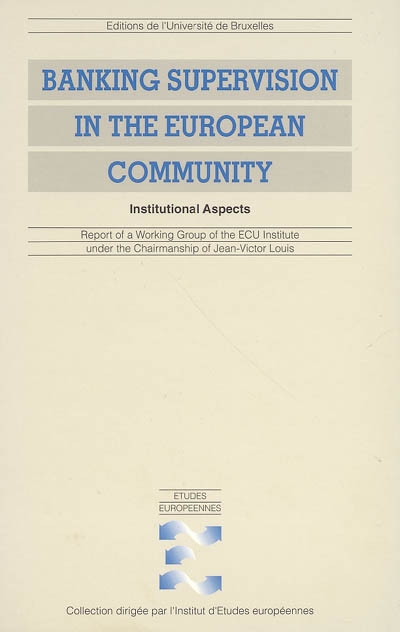en savoir plus

Carte fidélité
Permet à tous ses détenteurs d'obtenir 5% de réduction sur tous les livres lors du retrait en magasin (réduction non cumulable avec les réductions de type étudiant).
Offre également un certain nombre d'avantages auprès de nos partenaires.
Wishlist
Avec les favoris, retrouvez dans un espace les sélections effectuées au fur et à mesure de vos navigations dans le site.
Constituez pour votre usage personnel vos listes de livres en prévisions d'achats futurs et votre sélection d'articles, dossiers, événements, vidéos ou podcasts préférés ou à découvrir plus tard...
Il suffit simplement de cliquer sur "Ajout Favori" sur chaque page qui vous intéresse pour les retrouver ensuite dans votre espace personnel.
Requiert un compte Mollat
Mes Alertes
Requiert un compte Mollat
Banking supervision in the European community : institutional aspects
Auteur : ECU INSTITUTE (Lyon)
en savoir plus
Résumé
Réunit plusieurs contributions sur les marchés financiers et la politique monétaire européenne. Les auteurs analysent les aspects institutionnels du contrôle prudentiel dans les Etats membres de l'Union et aux Etats-Unis. Ils étudient également le Traité de Maastricht et le rôle de la Banque centrale européenne, en vue d'une meilleure réglementation européenne. ©Electre 2024
Lire la Quatrième de couverture
Réduire la Quatrième de couverture
How has prudential supervision to be conceived and organized for an emerging single financial market ? This is the concern of the present book which consists in a report prepared by an international group of experts chaired by Professor Jean-Victor Louis and working in the framework of the ECU Institute, based in Lyon.
What are the objectives of prudential control ? Does the new situation deriving from the Single Market directives and the perspective of the Monetary Union require to supplement and coordinate the existing system of supervision - a "patchwork of tradition" - in the Member States ? What are the possible orientations to recommend ?
In this book - which includes in a second part reports on the organization of prudential control in each of the twelve Member States, before the widening of the Union, and a report on the United States - the authors explain why they consider that the application of the primary responsibility for solvency questions of the authorities of the Home Country of the institutions, completed by a network of (bilateral) co-operation between authorities, is not possibly able to guarantee the systemic stability which is the main target of supervision, the risks being increased by the expansion of activities at continental dimensions. They believe that some measure of centralization is needed, and therefore compatible with the principle of subsidiarity. This centralization is requested as far as legislation and regulation are concerned but direct responsibilities for the control of larger banks can also be placed in the hands of a central authority. The Maastricht Treaty gives some limited powers and provides for a possible transfer of competences to the European Central Bank. However, the report which states the arguments in favor and against concentration of prudential supervision in the hands of a central bank does not exclude the possibility of creating a specialized authority which could have a larger horizontal competence (conglomerates, securities, insurances) than a central bank. It would be useful to introduce in the treaty at the Intergovernmental Conference of 1996, an enabling clause which would provide for the possible creation of such a specialized authority which should work hand in hand with the European Central Bank.
Fiche Technique
Paru le : 18/04/1996
Thématique : Politique monétaire et budgétaire
Auteur(s) : Auteur : ECU INSTITUTE (Lyon)
Éditeur(s) :
Ed. de l'Université de Bruxelles
Collection(s) : Etudes européennes
Série(s) : Non précisé.
ISBN : Non précisé.
EAN13 : 9782800411132
Reliure : Broché
Pages : 308
Hauteur: 24.0 cm / Largeur 16.0 cm
Épaisseur: 2.0 cm
Poids: 550 g
